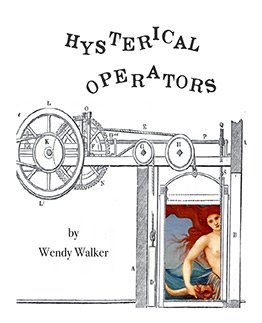IN 1991 I BEGAN A NOVEL about a young girl named Constance Kent and her involvement in the famous murder case that inspired Wilkie Collins’ The Moonstone. Many aspects of the case intrigued me, not only the fact that Constance confessed to a crime she almost certainly did not commit, but that her confession rattled the relation of Church and State. In the course of writing about the sensational circumstances of the crime, I came to feel that I should not be using them in fiction; that it would be exploitative to use my own fiction to overturn Constance’s. I put the manuscript away. When I later returned to the subject, I wrote a very different kind of book, Blue Fire (Proteotypes, 2009), a polyphonic experiment in poetic nonfiction. That book asks the reader to hear many voices– not subsumed within my own– and to consider the complex ways in which the story of the crime echoes and informs other contemporary stories.
So, back to Hysterical Operators… It is the only surviving piece of my abandoned novel about Constance Kent. This is the scene that leads up to the killing. It relates the nighttime tryst in which the father of the little boy, the victim in the case, visits his son’s nanny in the nursery where the boy was sleeping. In a dialogue of contrasting modes, Mr. Kent, the Inspector of Factories, speaks in an assemblage of technical language drawn from Andrew Ure’s Philosophy of Manufactures (1835), and the nursemaid replies with floating fragments of Victorian melodrama.
This fragment was one of my first critical fictions, taking as its target not an author or a book, but an historical event that had important literary and social repercussions.
Note: This text is collected in My Man and Other Critical Fictions.
Hysterical Operators: The Inspector of Factories Visits the Lover of Melodrama
Proteotypes, 2010
Paperback | $10
8 ¼ x 10 ½ inches | 12 pp
Cover image of first printing (Philip Chen) and second printing (Margot Leaf)

